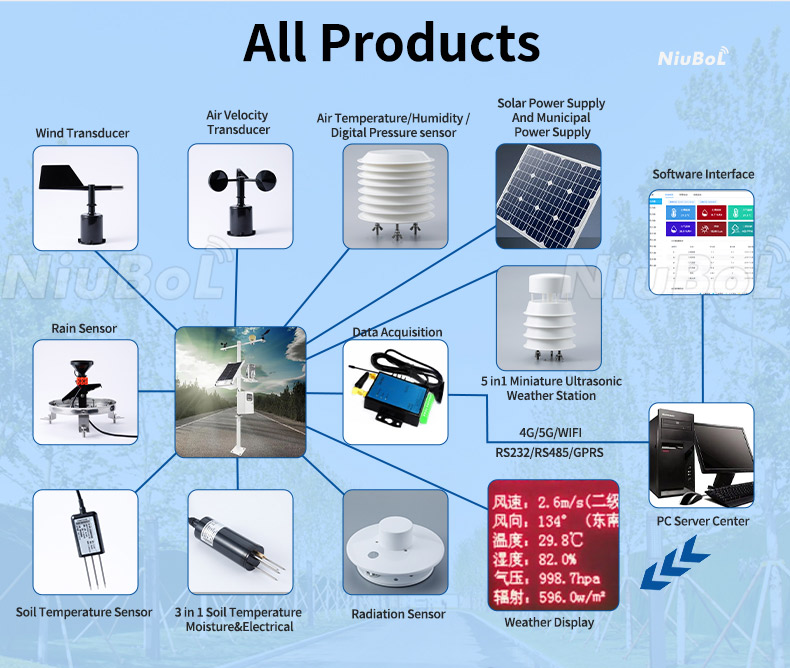

— Products —
 Consumer hotline +8618073152920
Consumer hotline +8618073152920 WhatsApp:+8615367865107
Address:Room 102, District D, Houhu Industrial Park, Yuelu District, Changsha City, Hunan Province, China
All products
soil moisture sensor for irrigation system is a device that measures the moisture content in the soil at a specific depth.Soil moisture sensors play a crucial role in optimizing irrigation systems by providing real-time data on soil moisture levels.By integrating soil moisture sensors into an irrigation system, farmers can effectively manage water resources, prevent overwatering or underwatering, and improve crop health and yield.
Tel/WhatsApp:+8615367865107
Email:Arvin@niubol.com +Nearly 100 partner company in more than 68 countries. We are committed to providing high-quality, practical products to meet your needs and help you solve problems.Product Details





A soil moisture sensor for irrigation system is a device that measures the moisture content in the soil at a specific depth.Soil moisture sensors play a crucial role in optimizing irrigation systems by providing real-time data on soil moisture levels.By integrating soil moisture sensors into an irrigation system, farmers can effectively manage water resources, prevent overwatering or underwatering, and improve crop health and yield.
1. Moisture Sensor Installation: The sensor is installed at the desired depth in the soil, where the roots of the plants are typically found. It can be embedded in the soil or placed on top, depending on the type of sensor.
2. Moisture Level Detection: The sensor continuously monitors the soil moisture level. It does this by measuring parameters such as capacitance, resistivity, or conductance, which vary with the moisture content of the soil.
3. Data Transmission: The moisture sensor may send data to a controller, which can be a simple timer, a microcontroller, or a part of a smart irrigation system connected to a computer or a smartphone.
4. Irrigation Control: Based on the soil moisture readings, the controller makes decisions about turning the irrigation system on or off. If the soil moisture level falls below a predefined threshold, indicating that the plants need water, the controller activates the irrigation system.
5. Adjustment of Irrigation Schedule: The system can also adjust the duration of the irrigation based on the moisture level detected. Soil that is too wet can be damaged by overwatering, just as soil that is too dry needs supplemental water.
6. Water Conservation: By ensuring that water is applied only when necessary, soil moisture sensors help conserve water. This is particularly important in regions with water scarcity or where water usage is regulated.
7. Smart Irrigation Integration: In smart irrigation systems, soil moisture sensors can be integrated with weather data and other sensors to create a dynamic watering schedule that adapts to changing conditions.
When selecting a soil moisture sensor for an irrigation system, consider factors such as the type of sensor, its accuracy, the depth at which it can be used, the frequency of reading, the communication protocol (e.g., Wi-Fi, Bluetooth, 4G, RS485, RS232, ZigBee), and the compatibility with your existing irrigation infrastructure.


Here are some key benefits and considerations for using soil moisture sensors in an irrigation system:
1.Precision Irrigation:
- Soil moisture sensors enable precision irrigation by providing accurate and timely information about the moisture content in the soil.
- Farmers can adjust irrigation schedules based on actual soil moisture levels, ensuring that plants receive the right amount of water at the right time.
2.Water Conservation:
- By avoiding overwatering, soil moisture sensors help conserve water resources and reduce water wastage.
- Optimal irrigation practices guided by soil moisture data contribute to water efficiency and sustainability in agriculture.
3. Improved Crop Health and Yield:
- Maintaining proper soil moisture levels is essential for promoting healthy root development and maximizing crop yield.
- By preventing water stress or waterlogging, soil moisture sensors assist in creating optimal growing conditions for plants.

4.Automated Irrigation Control:
- Soil moisture sensors can be integrated with automated irrigation systems to trigger irrigation events based on preset moisture thresholds.
- This automation reduces the need for manual intervention and ensures consistent and efficient water management.
5.Data Analysis and Decision-Making:
- Soil moisture sensor data can be analyzed to gain insights into soil moisture trends, crop water requirements, and irrigation patterns.
- Farmers can make informed decisions about irrigation scheduling, crop management practices, and resource allocation based on reliable soil moisture data.
6.Soil moisture sensors Installation and Calibration:
- Proper installation and calibration of soil moisture sensors are essential for accurate and reliable measurements.
- Sensors should be strategically placed in the root zone of plants at different depths to capture a representative view of soil moisture conditions.
Overall, incorporating soil moisture sensors into an irrigation system empowers farmers to implement targeted and efficient irrigation strategies, leading to improved crop performance, resource conservation, and sustainable farming practices.

NBL-S-THR-Soil-temperature-and-moisture-sensors-Instruction-Manual-V4.0.pdf
Sensors & Weather Stations Catalog
Agriculture Sensors and Weather Stations Catalog-NiuBoL.pdf
Weather Stations Catalog-NiuBoL.pdf
Related recommendations
 Multi-Depth Soil Sensor RS485
Multi-Depth Soil Sensor RS485 TDR Soil Moisture Sensor
TDR Soil Moisture Sensor Pyranometer Solar Radiation Sensors
Pyranometer Solar Radiation Sensors Soil ph sensor
Soil ph sensor Tipping Bucket Rain Gauge
Tipping Bucket Rain Gauge Air Temperature and Humidity Sensor
Air Temperature and Humidity Sensor
Screenshot, WhatsApp to identify the QR code
WhatsApp number:+8615367865107
(Click on WhatsApp to copy and add friends)